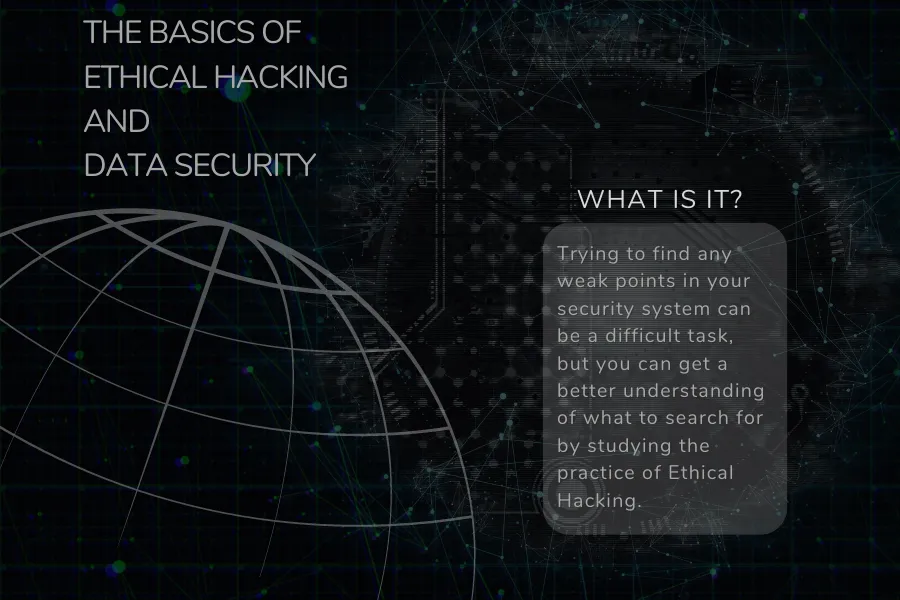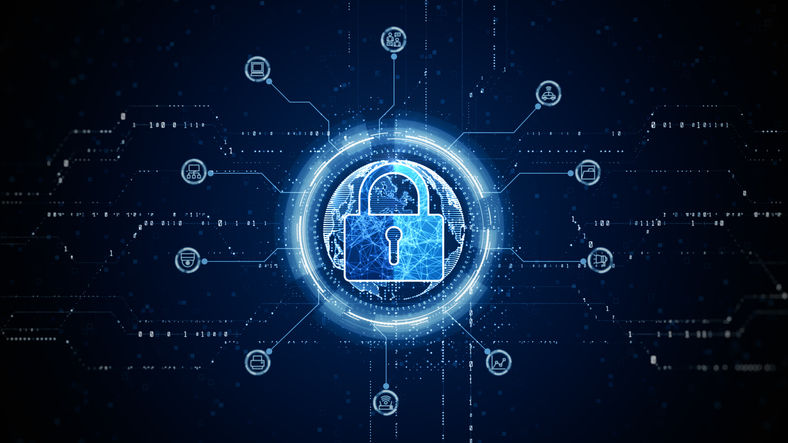Blog
Business IT articles and News

The Basics of Ethical Hacking and Data Security
The Basics of Ethical Hacking and Data Security
Trying to find any weak points in your security system can be a difficult task, but you can get a better understanding of what to search for by studying the practice of Ethical Hacking.
Introduction
Data security is a growing concern in today’s digital world. With the increasing number of online threats, it’s important to have strategies in place to protect your information. One such strategy is ethical hacking, which is the practice of testing a computer system or network for security flaws and vulnerabilities. In this blog post, we’ll explore the basics of ethical hacking and data security and provide guidance on how to keep your information safe.
Understanding Ethical Hacking

Ethical hacking refers to the practice of using hacking techniques to identify and patch security vulnerabilities in computer systems, applications, and networks. Ethical hackers are individuals who are authorized by an organization to test their security defenses in a safe and controlled environment.
The goal of ethical hacking is to identify potential threats to the safety and security of sensitive data, such as personal information, financial data, and intellectual property. By simulating a real-world cyberattack, ethical hackers can identify areas of weakness and make recommendations to improve an organization's security posture.
Unlike black hat hackers who use their skills for malicious purposes, ethical hackers are bound by a code of ethics and operate within the confines of the law. Ethical hackers must obtain permission from an organization before performing any testing and must adhere to strict guidelines to ensure the safety and security of sensitive information.
By proactively identifying vulnerabilities, ethical hacking helps organizations avoid costly data breaches and maintain the trust of their customers and stakeholders. It is an essential component of a comprehensive data security strategy and should be conducted regularly to stay ahead of evolving threats in the cyber landscape.
Why is Ethical Hacking Important?
As our reliance on technology grows, the need for data safety becomes increasingly important. Cybersecurity threats and attacks are rampant, with malicious actors constantly looking for vulnerabilities in systems to exploit. This is where ethical hacking comes in. Ethical hacking is an essential practice that organizations use to proactively identify and address potential cybersecurity threats before they can be exploited by hackers.
Ethical hacking is important because it helps organizations understand the potential weaknesses in their systems and networks, and gives them the opportunity to take corrective measures before they become a target for cyberattacks. By allowing ethical hackers to find vulnerabilities in their systems, organizations can safeguard against future cyberattacks and protect sensitive information.
Furthermore, ethical hacking plays a crucial role in protecting individuals and their data. In today's digital age, individuals' personal information is being collected and stored more than ever before, making them more susceptible to data breaches and identity theft. Ethical hacking helps to identify vulnerabilities in these systems and allows companies to strengthen their security protocols, ultimately safeguarding the personal information of individuals.
In summary, ethical hacking is important because it helps organizations stay ahead of cyber threats, safeguard against data breaches and protect the privacy of individuals. By proactively identifying vulnerabilities, ethical hackers can help organizations keep their systems safe from malicious actors and maintain trust with their customers.
Different Types of Ethical Hacking
Ethical hacking is a broad field that encompasses different types of hacking methodologies, all with the goal of improving the security of an organization's systems and data. Some of the different types of ethical hacking include:
1. Network Hacking: Network hacking involves finding vulnerabilities in an organization's network infrastructure and exploiting them to gain unauthorized access. This can include testing firewalls, routers, and other network devices for weaknesses.
2. Web Application Hacking: Web application hacking involves finding vulnerabilities in an organization's web applications, such as websites or online portals. This can include testing for common exploits such as SQL injection and cross-site scripting.
3. Mobile Application Hacking: Mobile application hacking involves finding vulnerabilities in an organization's mobile applications, which are increasingly popular for accessing sensitive data. This can include testing for vulnerabilities in both the mobile app and the backend systems that the app interacts with.
4. Social Engineering: Social engineering involves using psychological manipulation to gain access to an organization's systems or data. This can include tactics such as phishing emails or phone calls to trick employees into giving up their login credentials.
5. Wireless Network Hacking: Wireless network hacking involves finding vulnerabilities in an organization's wireless network infrastructure, such as Wi-Fi hotspots or Bluetooth connections. This can include testing for common exploits such as man-in-the-middle attacks.
Each of these types of ethical hacking requires specialized skills and tools, and ethical hackers typically specialize in one or more of these areas. By employing a range of testing methodologies, ethical hackers can provide a comprehensive assessment of an organization's security posture, and identify vulnerabilities that may have been overlooked by traditional security measures.
The Skills Required for Ethical Hacking
Becoming an ethical hacker requires a range of technical and non-technical skills. Ethical hackers need to be skilled in various areas of computer security and have an in-depth knowledge of different operating systems, programming languages, and networking technologies. Additionally, ethical hackers need to possess critical thinking and problem-solving skills, as well as a strong understanding of social engineering.
Some of the technical skills that ethical hackers should have include knowledge of programming languages such as Java, Python, and C++, experience with network security tools, and proficiency in Linux and other operating systems. Additionally, ethical hackers need to be familiar with databases and web applications and understand how they can be exploited.
On the non-technical side, ethical hackers should have excellent communication and interpersonal skills, as they need to be able to work collaboratively with other IT professionals, such as security analysts and developers. Ethical hackers must be able to effectively communicate the results of their assessments and recommendations to others.
One of the most important skills that an ethical hacker should have is a passion for learning and staying up to date with the latest cybersecurity trends and technologies. The field of cybersecurity is constantly evolving, and ethical hackers need to be able to adapt quickly to new threats and vulnerabilities.
Overall, becoming a successful ethical hacker requires a combination of technical and non-technical skills, as well as a willingness to continually learn and grow in this rapidly changing field.

Steps to Becoming an Ethical Hacker
If you are interested in becoming an ethical hacker, there are a few steps you can take to start your journey.
1. Get a Solid Foundation in Computer Science: To be a good hacker, you need to have a solid foundation in computer science. This means studying computer networks, operating systems, programming languages, and other related fields.
2. Learn Programming: Ethical hacking requires a lot of programming skills. Therefore, you need to learn programming languages such as Python, Java, Ruby, and C++.
3. Familiarize Yourself with the Tools: To become an ethical hacker, you need to be familiar with different hacking tools and software. Some of the commonly used tools include Kali Linux, Metasploit, Wireshark, and Nmap.
4. Gain Knowledge of Network Security: To be an ethical hacker, you need to understand the basics of network security. This involves understanding how computer networks work, identifying security vulnerabilities, and developing strategies to prevent unauthorized access.
5. Pursue Certification: Several certifications can help you advance your ethical hacking career. Some of the popular ones include the Certified Ethical Hacker (CEH), Certified Information Systems Security Professional (CISSP), and Certified Information Security Manager (CISM).
6. Participate in Ethical Hacking Communities: Participating in ethical hacking communities can help you connect with other hackers, share knowledge, and learn new skills. These communities include forums, online communities, and social media platforms.
7. Gain Hands-On Experience: The best way to become an ethical hacker is to gain hands-on experience. You can achieve this by participating in hackathons, capture-the-flag competitions, and other related events.
By following these steps, you can develop the necessary skills and knowledge to become an ethical hacker. Remember, becoming an ethical hacker requires dedication, hard work, and a passion for technology.
Tools Used in Ethical Hacking
Ethical hackers rely on a wide variety of tools to uncover vulnerabilities and security flaws within computer networks and systems. These tools can be both commercial and open-source software. Here are some commonly used tools in ethical hacking:
Vulnerability Scanner: This tool automatically scans computer systems and networks for known vulnerabilities that can be exploited by attackers. It then provides a report on the security loopholes found.
Password Cracker: Ethical hackers often use password cracking tools to gain access to user accounts, servers, or databases. These tools use a brute-force method to crack passwords.
Packet Sniffer: A packet sniffer captures and analyzes data packets traveling across a network. This helps in identifying potential security threats, including unencrypted login credentials, suspicious activity, or even malware.
Network Scanning Tool: This tool identifies active devices on a network, their open ports, and the services they run. It helps ethical hackers discover vulnerabilities that can be exploited.
Exploit Framework: An exploit framework is a set of tools used to create and test exploits for discovered vulnerabilities. Ethical hackers use exploit frameworks to test whether a vulnerability can be exploited or not.
Forensic Tool: This tool is used for post-incident investigations and recovery. It helps in gathering evidence, analyzing log files, and recovering data that has been deleted or damaged.
These tools are only a few examples of what ethical hackers use to test the security of computer systems. It is important to note that these tools are only effective in the hands of skilled professionals who know how to use them properly.
As the cyber threats continue to grow and evolve, ethical hacking is becoming increasingly important to ensure the security and safety of our digital lives.
Benefits of Ethical Hacking for Organizations
In today's digital world, data breaches and cyber-attacks are rampant. Organizations, especially those dealing with sensitive data, are always under threat of such attacks. However, ethical hacking can be used as an effective tool to safeguard against such attacks and ensure the security of their data.
One of the key benefits of ethical hacking for organizations is that it helps identify vulnerabilities in their systems before attackers can exploit them. This allows the organization to take preventive measures and patch up any weaknesses in its system to avoid a data breach.
Moreover, ethical hacking provides a comprehensive evaluation of the security of an organization's digital infrastructure. This allows businesses to better understand their weaknesses, improve security protocols, and build more robust security systems.
Ethical hacking also helps in maintaining the reputation and trust of an organization among its customers. In case of a data breach, organizations are at risk of losing customers and their reputation in the market. By conducting ethical hacking, businesses can assure their customers that they are taking all necessary measures to protect their data.
Furthermore, ethical hacking also helps organizations comply with legal and regulatory requirements related to data security. Organizations that deal with sensitive data are bound by law to protect it from unauthorized access and theft. By conducting ethical hacking, businesses can demonstrate their compliance with these laws and regulations.
Risks Associated with Ethical Hacking
While ethical hacking may be an effective tool for identifying and mitigating potential cyber threats, it is not without its own set of risks and challenges.
One of the primary risks associated with ethical hacking is the possibility of unintended consequences. Even with the best intentions and most careful planning, ethical hackers may inadvertently cause damage or disruption to systems or networks. This could result in data loss, downtime, or even security breaches.
Another risk is the potential for legal or regulatory issues. Ethical hacking can often blur the lines between legal and illegal activities, particularly when it involves probing or accessing sensitive systems without proper authorization. Depending on the specific circumstances and jurisdiction, ethical hackers may be subject to civil or criminal penalties if they run afoul of applicable laws.
There is also the risk of ethical hacking being used for malicious purposes. While ethical hackers are tasked with identifying and remedying vulnerabilities, unscrupulous individuals or organizations could potentially use the same techniques to exploit weaknesses for their own gain. This highlights the importance of clear guidelines and ethical standards in the practice of ethical hacking.
Lastly, ethical hacking can also create a false sense of security. While the aim of ethical hacking is to identify and address vulnerabilities before they can be exploited, it is important to remember that no system or network can be made completely impervious to attack. Ethical hacking should therefore be seen as one tool among many in an organization's overall cybersecurity strategy.




